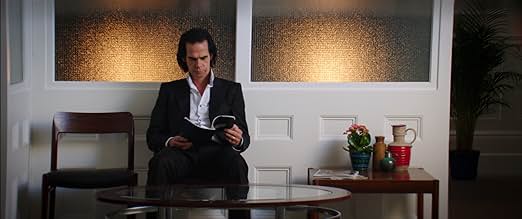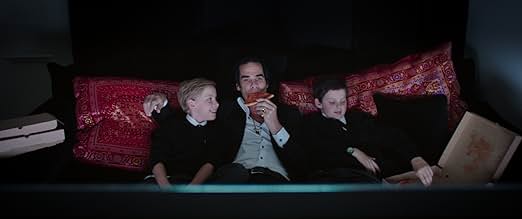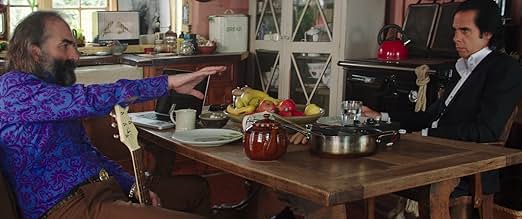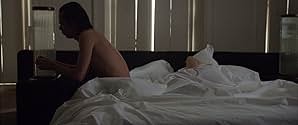ÉVALUATION IMDb
7,4/10
12 k
MA NOTE
Ajouter une intrigue dans votre langueWriter and musician Nick Cave marks his 20,000th day on the planet Earth.Writer and musician Nick Cave marks his 20,000th day on the planet Earth.Writer and musician Nick Cave marks his 20,000th day on the planet Earth.
- Directors
- Writers
- Stars
- Nominé pour le prix 1 BAFTA Award
- 8 victoires et 18 nominations au total
Susie Bick
- Susie Cave
- (as Susie Cave)
Avis en vedette
Nick Cave is a very special musician. In fact musician may be the wrong descriptor.
He's a very special writer that specialises in music. He has Warren Ellis and his many collaborators to dial up the music side of the equation.
in this documentary, that looks like a movie, that, yes, he co-wrote, you find yourself immersed in the mind of a genius for an hour and a half as he discusses his life, his loves, his inspirations and his deep internal psychology in something approaching forensic detail.
He is a very beautiful man.
He talks painfully honestly at times about everything that is true to him. His 'muse' - his wife Susie who lies, back turned to camera in bed with him as the film opens.
We see half glimpses, stolen moments, of her off and on through the film but little more. We see a photo of her projected on the wall of his archivist's office.
She is as beautiful as he is.
Later we see Cave guzzle pizza with their twin sons, arm around the shoulders of one of them, devoid of comment/emotion, almost voyeuristically. It also spells L.O.V.E.
We see him kiss Warren Ellis full square on the lips as he visits his musical 'muse' on the occasion of a casual lunch of eels in black pasta. More love.
Cave carries an aura of love around with him. Yet he's often labelled with hate (partly because of the baggage of The Birthday Party have burdened him with. Grinderman, in this respect cannot help.)
We see him in the recording studio.
Gold dust. (Watching drummer Thomas Wydler as he twitches and mouths the rhythms is mesmeric.)
We see him crafting lyrics.
Gold dust. (His notebooks are works of art in their own right.)
We see him performing live.
Now, this is the thing. Anyone who has been to a Nick Cave and the Bad Seeds gig knows that no band on earth put in the same level of emotional commitment to their music; (perhaps with the exception of his faux-misogyny project Grinderman) Ellis all crazy violin fury, Cave all emotional connection.
It's this latter point that made the movie for me. He talks about how he ensnares individual audience members and then demonstrates it with a live performance of Higgs Boson Blues that reduced his female 'victim' to tears.
Me too. It was all too much. All too emotionally engrossing.
And then there's the craft...the soundtrack (obviously) the direction and the cinematography are all sublime. A special shout out has to go for editor, Jonathan Amos.
And the cameos; Kylie, Ray Winstone and Blixa Bargeld.
I'm left with a tantalising question. Is this the greatest film ever made about music?
I think it has claims on that. Notwithstanding School of Rock.
Nick Cave. {I love you man.)
He's a very special writer that specialises in music. He has Warren Ellis and his many collaborators to dial up the music side of the equation.
in this documentary, that looks like a movie, that, yes, he co-wrote, you find yourself immersed in the mind of a genius for an hour and a half as he discusses his life, his loves, his inspirations and his deep internal psychology in something approaching forensic detail.
He is a very beautiful man.
He talks painfully honestly at times about everything that is true to him. His 'muse' - his wife Susie who lies, back turned to camera in bed with him as the film opens.
We see half glimpses, stolen moments, of her off and on through the film but little more. We see a photo of her projected on the wall of his archivist's office.
She is as beautiful as he is.
Later we see Cave guzzle pizza with their twin sons, arm around the shoulders of one of them, devoid of comment/emotion, almost voyeuristically. It also spells L.O.V.E.
We see him kiss Warren Ellis full square on the lips as he visits his musical 'muse' on the occasion of a casual lunch of eels in black pasta. More love.
Cave carries an aura of love around with him. Yet he's often labelled with hate (partly because of the baggage of The Birthday Party have burdened him with. Grinderman, in this respect cannot help.)
We see him in the recording studio.
Gold dust. (Watching drummer Thomas Wydler as he twitches and mouths the rhythms is mesmeric.)
We see him crafting lyrics.
Gold dust. (His notebooks are works of art in their own right.)
We see him performing live.
Now, this is the thing. Anyone who has been to a Nick Cave and the Bad Seeds gig knows that no band on earth put in the same level of emotional commitment to their music; (perhaps with the exception of his faux-misogyny project Grinderman) Ellis all crazy violin fury, Cave all emotional connection.
It's this latter point that made the movie for me. He talks about how he ensnares individual audience members and then demonstrates it with a live performance of Higgs Boson Blues that reduced his female 'victim' to tears.
Me too. It was all too much. All too emotionally engrossing.
And then there's the craft...the soundtrack (obviously) the direction and the cinematography are all sublime. A special shout out has to go for editor, Jonathan Amos.
And the cameos; Kylie, Ray Winstone and Blixa Bargeld.
I'm left with a tantalising question. Is this the greatest film ever made about music?
I think it has claims on that. Notwithstanding School of Rock.
Nick Cave. {I love you man.)
The world abounds with concert films and other documentaries with no greater ambition than following a famous person around for a while. These films are usually easy to put in the "superfans only" category. But maybe that wouldn't be the case if they were more like 20, 000 Days on Earth. All I can say is that, as someone who has one Nick Cave album but no vast devotion to the guy, I was entertained throughout.
Part of this is simply the beauty of the images -- the directors make even the most mundane scene stun on the screen. The film takes place across one mostly ordinary day in Nick Cave's life, purportedly the 20000th, and much of the runtime is taken up by fascinating conversations Cave has with friends and collaborators. There are a lot of stagey scenes that don't hide their constructedness, such as a filmed therapy session, or a meta- cinematic moment where at the behest of the film's producers Cage goes through old pictures that will soon become part of the opening montage. And then there is the obligatory concert footage, shot in a dynamic fashion that manages to pick up all of Cave's subtle interactions with the front row and the looks of desperate adoration on the audience's faces.
All of this would be for naught if Cave wasn't a fascinating subject. He plays the brooding poet here, providing ominous narration throughout the film, but there are also humanizing scenes where he watches TV with his sons or grumpily bosses around a children's choir (one of the more surreal moments here). It may be more charisma than intellect, but damn if I couldn't listen to Nick Cave talk for days. For all the directorial skill brought to 20, 000 Days on Earth, its greatest virtue may be in simply allowing us to experience two hours of Cave.
Part of this is simply the beauty of the images -- the directors make even the most mundane scene stun on the screen. The film takes place across one mostly ordinary day in Nick Cave's life, purportedly the 20000th, and much of the runtime is taken up by fascinating conversations Cave has with friends and collaborators. There are a lot of stagey scenes that don't hide their constructedness, such as a filmed therapy session, or a meta- cinematic moment where at the behest of the film's producers Cage goes through old pictures that will soon become part of the opening montage. And then there is the obligatory concert footage, shot in a dynamic fashion that manages to pick up all of Cave's subtle interactions with the front row and the looks of desperate adoration on the audience's faces.
All of this would be for naught if Cave wasn't a fascinating subject. He plays the brooding poet here, providing ominous narration throughout the film, but there are also humanizing scenes where he watches TV with his sons or grumpily bosses around a children's choir (one of the more surreal moments here). It may be more charisma than intellect, but damn if I couldn't listen to Nick Cave talk for days. For all the directorial skill brought to 20, 000 Days on Earth, its greatest virtue may be in simply allowing us to experience two hours of Cave.
We open with Nick Cave in bed. Soon he's half-naked before the mirror. But this semi-staged documentary is no warts-and-all exposé. The lighting is kind to Cave's boyish body, and his voice-over is as precisely prepared as it is passionate and poetic. This rehearsed vulnerability sets the tone for how directors Iain Forsyth and Jane Pollard will portray their elusive subject.
Their approach provides Cave with an appropriate level of control. Control is essential to the process of self-mythologising. Cave is aware that myth is what gives popular artists their enduring legacy. It's not dishonesty. Myth contains truth: the truth of how art (and the artist) makes us feel, the senses it triggers and the images it conjures. And what images Cave has conjured over the decades; from surreal punk, through broken Americana, through dark ballads and blaring gospel rock and a parade of delicious dirges.
The focus on the recording of Push the Sky Away means we hear very little of The Bad Seeds' earlier work. We glimpse The Birthday Party (and a very amusing vignette it is). But Cave and his myriad members have gone through various phases, and we get no sense of these because we hear nothing of them. Do not go into this film expecting a retrospective. Do not expect chronology, or even much revelation. Do not expect to bring a virginal friend and open their eyes to the strange, bleak, sentimental narratives of Brighton's finest immigrant. And yet it is a film for virtually everyone; for those harbouring an idea and a glimmer of interest in the creative method.
You'll know from the trailer that Ray Winstone and Kylie Minogue drop by for a ride in Cave's car. These scenes are more than just elaborate name-drops. They're framed as natural exchanges perhaps imagined or drawn from memory. Most moving is the conversation with ex-Bad Seed Blixa Bargeld, which has the air of some latent regret being cauterised.
Toward the beginning of the film there are a number of intense dialogues between Cave and the psychoanalyst Darian Leader. These scenes are deeply intimate and engaging, and it's a pity they fall away. It's indicative of the broader sense that 20,000 Days is truncated. Surely there's more footage. There is, surely, a three-hour edit of this movie, just as compelling and original and humorous. Yes, this is a double-edged criticism.
Elegantly shot and exquisitely edited, there's warmth in every frame of this movie, whether we're in the archives, scouring scuzzy photographs from Cave's youth, or in the pleasingly chaotic space surrounding the typewriter of dreams. Forsyth and Pollard carefully walk the line between hagiography and dehumanisation: Cave comes off as neither a fallen angel nor a mad recluse. But he does emerge an enigma. And that's okay, because that's how the man himself reckons we like our rock stars: slightly unreal, swaggering and contradictory, and bigger than God. I'm inclined to agree.
Their approach provides Cave with an appropriate level of control. Control is essential to the process of self-mythologising. Cave is aware that myth is what gives popular artists their enduring legacy. It's not dishonesty. Myth contains truth: the truth of how art (and the artist) makes us feel, the senses it triggers and the images it conjures. And what images Cave has conjured over the decades; from surreal punk, through broken Americana, through dark ballads and blaring gospel rock and a parade of delicious dirges.
The focus on the recording of Push the Sky Away means we hear very little of The Bad Seeds' earlier work. We glimpse The Birthday Party (and a very amusing vignette it is). But Cave and his myriad members have gone through various phases, and we get no sense of these because we hear nothing of them. Do not go into this film expecting a retrospective. Do not expect chronology, or even much revelation. Do not expect to bring a virginal friend and open their eyes to the strange, bleak, sentimental narratives of Brighton's finest immigrant. And yet it is a film for virtually everyone; for those harbouring an idea and a glimmer of interest in the creative method.
You'll know from the trailer that Ray Winstone and Kylie Minogue drop by for a ride in Cave's car. These scenes are more than just elaborate name-drops. They're framed as natural exchanges perhaps imagined or drawn from memory. Most moving is the conversation with ex-Bad Seed Blixa Bargeld, which has the air of some latent regret being cauterised.
Toward the beginning of the film there are a number of intense dialogues between Cave and the psychoanalyst Darian Leader. These scenes are deeply intimate and engaging, and it's a pity they fall away. It's indicative of the broader sense that 20,000 Days is truncated. Surely there's more footage. There is, surely, a three-hour edit of this movie, just as compelling and original and humorous. Yes, this is a double-edged criticism.
Elegantly shot and exquisitely edited, there's warmth in every frame of this movie, whether we're in the archives, scouring scuzzy photographs from Cave's youth, or in the pleasingly chaotic space surrounding the typewriter of dreams. Forsyth and Pollard carefully walk the line between hagiography and dehumanisation: Cave comes off as neither a fallen angel nor a mad recluse. But he does emerge an enigma. And that's okay, because that's how the man himself reckons we like our rock stars: slightly unreal, swaggering and contradictory, and bigger than God. I'm inclined to agree.
". . . The never-ending drip feed of eroticism" Nick Cave
I'm not sure either what that quote means, but what you may get is a sense of writer/musician Nick Cave's poetic inclinations and the sensuality of his life, encapsulated in a fictional day, his 20,000 day on earth to be specific. Starring him, of course, because he is the center of his universe, and he believes, maybe a deity or an angel. He once said about his creations: "I can't explain that dividing line between nothing and something that happens within a song, where you have absolutely nothing, and then suddenly you have something. It's like the origin of the universe."
This smooth fictional biography, partially narrated by Cave, first takes us in his fine car, which he always drives, to visit his therapist (scene so relaxed and interesting I wish we could have heard the results). Then lunching with band mate Warren Ellis, where the talk is mostly music, and over to an archive brimming with his memorabilia.
Interspersed are performances with The Bad Seeds, from his almost Leonard Cohen-like poetic music to his Jagger-like rocking in Sydney (he's an Aussie), where the capacity crowd is fully under his spell. As he speaks through the music about its transforming power, he also shows us his struggle to bring poems and lyrics together. He once said about author vs. musician: "Musicians are at the bottom of the creative pyramid and authors are at the top, and many people think it's unacceptable for someone to attempt to jump from the bottom to the top of the pyramid."
Along the way we see him and his sons eat pizza and watch Scarface. Although he seems to have little time for his family, when he does, it's relaxed just the way he presents himself to us in a film that gives much more insight into an artist's creative process than we usually get with bios.
"My music has to do with beauty, and it's intended to, if not lift the spirits, then be a kind of a balm to the spirits." Nick Cave
I'm not sure either what that quote means, but what you may get is a sense of writer/musician Nick Cave's poetic inclinations and the sensuality of his life, encapsulated in a fictional day, his 20,000 day on earth to be specific. Starring him, of course, because he is the center of his universe, and he believes, maybe a deity or an angel. He once said about his creations: "I can't explain that dividing line between nothing and something that happens within a song, where you have absolutely nothing, and then suddenly you have something. It's like the origin of the universe."
This smooth fictional biography, partially narrated by Cave, first takes us in his fine car, which he always drives, to visit his therapist (scene so relaxed and interesting I wish we could have heard the results). Then lunching with band mate Warren Ellis, where the talk is mostly music, and over to an archive brimming with his memorabilia.
Interspersed are performances with The Bad Seeds, from his almost Leonard Cohen-like poetic music to his Jagger-like rocking in Sydney (he's an Aussie), where the capacity crowd is fully under his spell. As he speaks through the music about its transforming power, he also shows us his struggle to bring poems and lyrics together. He once said about author vs. musician: "Musicians are at the bottom of the creative pyramid and authors are at the top, and many people think it's unacceptable for someone to attempt to jump from the bottom to the top of the pyramid."
Along the way we see him and his sons eat pizza and watch Scarface. Although he seems to have little time for his family, when he does, it's relaxed just the way he presents himself to us in a film that gives much more insight into an artist's creative process than we usually get with bios.
"My music has to do with beauty, and it's intended to, if not lift the spirits, then be a kind of a balm to the spirits." Nick Cave
The only thing I've been introduced with when it comes to Nick Cave is his score for The Assassination of Jesse James by the Coward Robert Ford, which is pretty much my favorite film score ever. Such soothing, haunting, mesmerizing music. In many ways, this film is exactly like that. I always find it interesting when filmmakers play around with what a documentary really is, and this does just that. It's very melancholic in its tone, very introspective. It has fascinating examples of music being created and just how much Cave puts himself into his music, while still balancing it all and not coming off like an ego project. Even for non-fans this is recommended.
Le saviez-vous
- Générique farfeluThe credits are shown over a twilight scene of Brighton, shot from the sea.
- ConnexionsFeatures La passion de Jeanne d'Arc (1928)
- Bandes originalesCan't Get You Out of My Head
Written by Cathy Dennis and Rob Davis (as Robert Davis)
Performed by Kylie Minogue
Published by EMI Music Publishing Ltd and Universal/MCA Music Ltd
Licensed courtesy of Parlophone Records Ltd
Meilleurs choix
Connectez-vous pour évaluer et surveiller les recommandations personnalisées
- How long is 20,000 Days on Earth?Propulsé par Alexa
Détails
- Date de sortie
- Pays d’origine
- Sites officiels
- Langue
- Aussi connu sous le nom de
- Dünyada 20,000 Gün
- Lieux de tournage
- sociétés de production
- Consultez plus de crédits d'entreprise sur IMDbPro
Box-office
- Brut – États-Unis et Canada
- 279 558 $ US
- Fin de semaine d'ouverture – États-Unis et Canada
- 27 879 $ US
- 21 sept. 2014
- Brut – à l'échelle mondiale
- 2 105 558 $ US
- Durée1 heure 37 minutes
- Couleur
- Mixage
- Rapport de forme
- 2.35 : 1
Contribuer à cette page
Suggérer une modification ou ajouter du contenu manquant

Lacune principale
By what name was 20,000 Days on Earth (2014) officially released in India in English?
Répondre



























